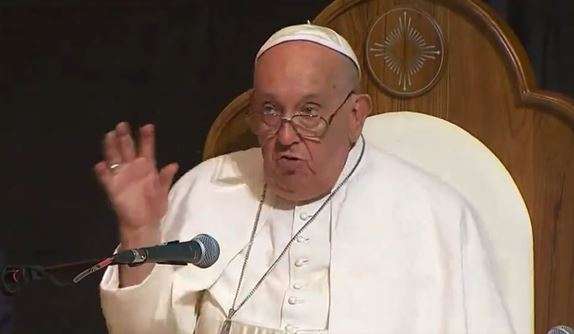In a powerful and highly debated statement, Pope Francis has addressed the upcoming 2024 U.S. elections, offering guidance to American Catholics navigating a politically charged environment. The Pope’s remarks have drawn significant attention, Asked about the U.S. presidential election on his flight back to Rome from Southeast Asia and Oceania, the pope said not welcoming migrants is a “grave” sin, and likened having an abortion to an “assassination.” particularly directed towards both leading candidates, Donald Trump and Kamala Harris, for their positions on immigration and abortion, respectively.

Asking the US Catholics to choose the “lesser evil,” Pope Francis has once again urged the faithful to make conscientious decisions that align with core values of Catholic teaching, even when presented with imperfect options.
In his comments on Friday, which came after a 12-day tour across Southeast Asia and Oceania, Pope Francis also lamented the lack of progress towards a peace deal to bring Israel’s war in Gaza to a close.
“Forgive me for saying so, but I don’t see any progress being made towards peace,” he told reporters on board the papal plane, adding that an Israeli strike on a school this week that killed Palestinian children was “ugly.”
Anti-Immigration Stance vs. Support for Abortion Rights
The Pope’s comments took aim at two of the most contentious issues in American politics: Donald Trump’s hardline anti-immigration policies and Kamala Harris’s strong support for abortion rights. These two candidates, seen as the frontrunners for their respective parties, each represent positions that deeply conflict with Catholic moral teachings.
Donald Trump’s Personal Attack on Kamala Harris: A Shift Away from Policy Debate
Pope Francis has been a vocal critic of nationalist and anti-immigrant policies throughout his papacy, and his stance on Trump’s immigration platform is consistent with this. Trump, who ran in 2016 and 2020 on promises to crack down on immigration, build a border wall, and institute travel bans from predominantly Muslim countries, continues to embrace policies that restrict immigration. The Pope, meanwhile, has called for the world to show greater compassion for refugees and migrants, emphasizing that caring for the “least among us.”
In contrast, the Pope’s concerns about Kamala Harris are rooted in her unwavering support for abortion rights. As a practicing Catholic, Harris has faced criticism from the Church for her stance, especially in the wake of growing efforts to protect abortion access in the U.S. following the overturning of Roe v. Wade which declared that the constitutional right to abortion, upheld for neary a half century, no longer exists..
The Concept of Choosing the “Lesser Evil”
The phrase “lesser evil” has long been used within Catholic moral theology to address situations where individuals are faced with morally complex choices. When voting, the Church teaches that Catholics must aim to support policies that best align with the teachings of Christ and the Church. However, when neither candidate fully upholds these values, Catholics are urged to choose the option that does the least harm and better serves the common good.
A Call to Moral Responsibility

The Pope’s remarks serve as a reminder of the Church’s broader call for Catholics to act as responsible citizens guided by their faith. While his criticism of Trump’s immigration policies and Harris’s abortion stance are clear, Pope Francis stops short of endorsing any candidate. Instead, he urges voters to use their moral compass to make decisions that reflect the teachings from faith, prioritizing care for the vulnerable, the preservation of life, and the promotion of human dignity.
The “lesser evil” in this election may look different for different Catholics, depending on how they weigh the moral implications of immigration policy, reproductive rights, economic justice, and other key issues. Pope Francis’ challenge to the faithful is to engage deeply with these issues and to make choices that contribute to a more compassionate and just society.
As American Catholics prepare to vote in 2024, the Pope’s words offer both a moral framework and a challenge: to reject simple partisan answers and instead seek solutions that align as closely as possible with their faith, even in an imperfect world. In doing so, they are called to look beyond individual candidates and toward the broader vision of justice, mercy, and human dignity that the Church upholds.

